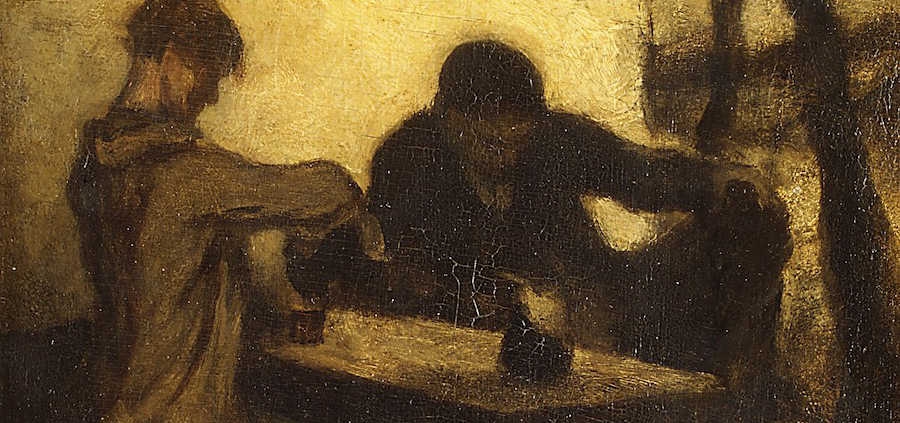The Great Deceiver by Mary Anne Dejewski, LCSW
Substance addictions like alcohol and drugs are merely the most visible form of addiction, but actually we are all addicted to our own habitual way of doing anything, our own defenses, and most especially, our patterned way of thinking, or how we process our reality.
– Richard Rohr, Franciscan priest and theologian
Addiction doesn’t happen overnight. It generally surfaces after years of dealing with unbearable physical or emotional pain. In the case of my maternal grandmother, alcohol offered her an escape and comfort. She became a single divorced mom in the 1920s, trying to deal with the pain of an unfaithful husband. She was also the only caregiver for her elderly, dying parents and her emotionally disabled younger brother, all living in the same house. Alcohol was a temporary release from these stressful situations.
For my paternal grandfather, gambling was the distraction that offered relief from the childhood tragedy of losing his younger sister in a house fire that he survived. My father became a workaholic, a more admirable addiction, but an addiction nonetheless. Work was his reason for having to leave school in the ninth grade to help pay family bills.
Addiction doesn’t discriminate between young or old, male or female, rich or poor. It crosses every line of society and affects most families in one way or another. When I look in the mirror, I recognize my own addictive personality traits. As Richard Rohr states, “We are all addicted to our own way of thinking.” My way of thinking has to do with how a house should look. Keeping a spotless house used to be more important to me than playing with my kids. Workaholism is certainly in my blood.
Addiction deprived me of having a relationship with my maternal grandmother, and gambling destroyed my paternal grandfather’s life. Although I knew my maternal grandmother well, I was never able to have so much as a casual conversation with her. In the last four or five years of her life, she simply sank into a deep depression and didn’t utter so much as a hello or goodbye. Alcohol had even destroyed her voice. My paternal grandfather’s gambling addiction focused mostly on horse racing. No one talked about why he lived alone in an apartment while my paternal grandmother lived in their home on Long Island. It was a family secret, a taboo, that could not be addressed. My family had a rule: no one was allowed to talk about the addiction of alcoholism or gambling.
If I were asked how I knew I didn’t want to marry someone who showed the potential for addiction, I’m not really sure I could answer. Something inside me was aware of what it might look like. For example, at my older brother’s wedding, the boy I was dating got carried away at the reception and continued his drinking at the afterparty. Bob, just a friend of mine at the time, now my husband, noticed how uncomfortable I was about leaving the wedding with my boyfriend and offered to drive me to the afterparty. I accepted and couldn’t believe my ears when I heard my boyfriend challenge Bob to a drinking contest. Pitchers of beer were brought to the table and my boyfriend filled two mugs, offered one to Bob, and started chugging away.
Feeling horrified, I watched the duel between them. Then I observed something remarkable. Bob kept hoisting his mug in a gesture of camaraderie, but rarely took a drink from it. Meanwhile, my boyfriend emptied every mug and kept coming back for more. At one point he jumped up on the table and challenged Bob, saying, “Let’s take this outside.” I listened and watched addiction pillage every ounce of dignity my boyfriend had.
Alcoholism also robbed me of a relationship with an older sibling. After several years, as my sibling sank further and further into alcoholism, I tried to talk to my parents about it. Their reaction surprised me. They thought I was overreacting. Questioning myself, I decided to go to an Al-Anon meeting and I felt grateful to hear what they call the “three Cs”:
You didn’t cause it.
You can’t control it.
You can’t cure it.
What a feeling of relief those simple words gave me! Al-Anon offered me a link to sanity, especially when my parents refused to accept or understand my older sibling’s descent into the depths of alcohol addiction.
“Perhaps an addiction grows too loud to ignore any longer,” writes Sue Monk Kidd in her book When the Heart Waits. When that moment comes, those struggling with addiction—and those who love them—might draw perspective from these further words of Richard Rohr: “[Y]ou cannot heal what you do not acknowledge, and what you do not consciously acknowledge will remain in control of you from within.”
After many years of volunteering for parish Pre-Cana, Marriage Encounter, and a diocesan marriage-in-crisis program, Mary Anne Dejewski decided to return to college. She earned a master’s in social work with a specialization in alcohol and substance abuse from Stony Brook University.





Leave a Reply
Want to join the discussion?Feel free to contribute!